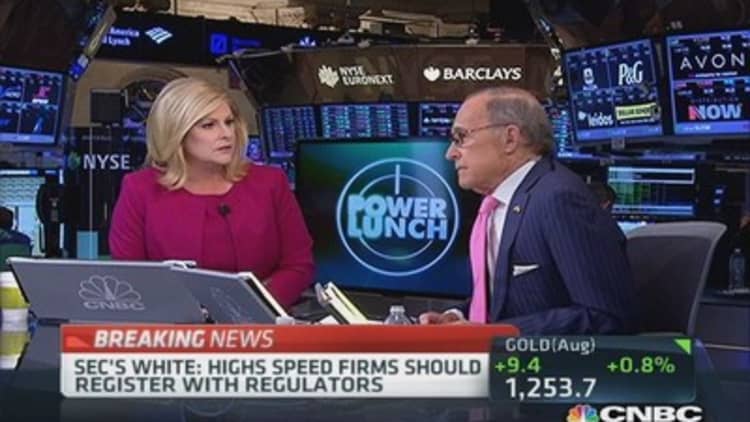SEC Chairwoman Mary Jo White gave a surprising broad speech about market structure at the Sandler O'Neill Exchange and Brokerage Conference in New York.
She spoke of the need for a "comprehensive review" of market structure, including rules adopted a decade ago that helped create high-speed trading.
Read MoreSEC chief: Major rules coming for HFT, dark pools
She began by insisting that investors are doing better today than they did in the past:
"[T]he current market structure is not fundamentally broken, let alone rigged."
She also said new rules put in place since the 2010 Flash Crash have made the markets safer. For example, market wide circuit breakers and limit up/limit down rules were put in place that are "moderating price volatility in individual securities."
Read MoreBank regulators have gone too far: Bove
But she made it clear there are aspects of the market that are troubling to the SEC. Much of her commentary was built around what, if anything, should be done about high frequency trading (HFT): "We must consider, for example, whether the increasingly expensive search for speed has passed the point of diminishing returns." She made it clear that she was wary of any attempt to make a rule that limited trading speed, but said she was open to other methods to address HFT, including affirmative or negative trading obligations for HFT firms. In other words, she is considering subjecting HFTs to certain obligations as market makers. This might require them to post more definitive bids and offers for longer periods, for example.
She also said she was concerned that certain "destabilizing" trading strategies might harm the markets during periods of high volatility. She has proposed an anti-disruptive trading rule that would apply to high-speed traders during periods of high volatility. She was vague on this proposal, but this is likely to be controversial.
She also is proposing to subject high frequency traders (HFT) and other "unregistered active proprietary traders" to a new rule requiring registration with the SEC and membership in FINRA, which is responsible for much of the regulatory oversight of the industry.
Read More
That's an interesting idea. Many HFT firms have objected to being required to join FINRA because of the relatively high cost.
She also spoke of the need to make sure the technology works as advertised. Reg SCI would mandate uniform testing standards for the technology used by the exchanges; after sitting on it for many months, the SEC is now finalizing rules that would put it in place.

Some of her most interesting comments were directed at dark pools. She made it clear that investors have seen benefits from more competition, including lower fees.
But she's also worried that too much volume may have gone to dark pools: "The consensus of the research is that the current extent of dark trading can sometimes detract from market quality, including the informational efficiency of prices."
The SEC is part of this problem, of course, since they are responsible for the market structure that allowed this to happen, and it's impressive that she acknowledged that: "Importantly, we will be considering whether the SEC's own rules, such as the trade-through rule of Regulation NMS, have contributed to excessive fragmentation across all types of venues."
Read MoreWord 'rigged' gave critics easy out: IEX exec
My sense is that the SEC is concerned that the pendulum has swung too far—too may Exchanges, too many Dark Pools—and they seem interested in driving more trading volume back to the Exchanges, and also increasing transparency in dark pools—specifically, who is trading in them.
The Chairwoman is also concerned about potential conflicts of interest among traders, including payment for order flow, where brokers receive payments for directing order flow to certain trading firms.
Her main concern is disclosure: "When fees and payments are not passed through from brokers to customers, they can create conflicts of interest and raise serious questions about whether such conflicts can be effectively managed."
Translation: more disclosure rules coming!
She also wants to examine the many order types that the exchanges have that dictate how and where orders are routed.
Finally, the SEC has been working on a pilot program to allow wider tick sizes for the stocks of smaller companies. Many think that allowing small cap stocks to trade in increments other than a penny will increase trading in those stocks. White said the Commission will soon complete its review for the terms of the pilot.
Much of this is clearly in the "we are studying" category. But the world is awash in "we are studying" commentaries. Let's see what kind of follow-up there is. I am all for a "comprehensive review" of market structure, but the devil is in the details. Such a study is likely to take years and buy the time it's done the technology has moved on. But maybe not. She's also proposed the creation of a Market Structure Advisory Committee that will be a sounding board for ideas. Maybe they will find a way to keep this front and center.
If we don't get a "comprehensive" review, at least we can get a series of small baby steps that will improve trading.


